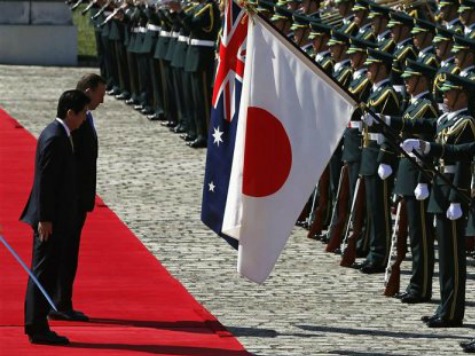
In a July speech, Australian Prime Minister Tony Abbott praised Japanese “sense of honor and skill” of Japanese submariners who attacked Australia during a 1942 raid on Sydney Harbour in World War II.
Abbott said, “We admired the skill and the sense of honour that they brought to their task although we disagreed with what they did. Perhaps we grasped, even then, that with a change of heart the fiercest of opponents could be the best of friends.”
Abbott made these comments as part of a larger push to build a stronger political and possibly military relationship between Australia and Japan to counter a fast rising China in the Pacific. However, given the incredible atrocities committed against Australian POWs during World War II, Abbott’s comments came off as bizarre and out of touch.
Abbott was quickly castigated by Chinese government officials. Chinese Foreign Ministry spokesman Hong Lei said, “Japanese fascist invaders brought profound suffering to people in a number of countries, including Australia, during World War II. Their aggression was extremely brutal.”
Many Australians disagreed with the Abbott’s comments too, especially many veterans. According to the Sydney Morning Herald, Returned and Services League of Australia president Rear Admiral Ken Doolan said, “Many members of the RSL will disagree with what the Japanese forces did during the Second World War.”
“There are, however, members of the RSL who are prepared to let bygones be bygones,” Doolan continued. “We respect those who fought the Japanese and do not share the prime minister’s point of view.”
In his book about the end of the Pacific War, Retribution: The Battle for Japan 1944-45, legendary World War II historian Max Hastings described some of the stunningly inhumane acts Japanese troops committed on Allied prisoners of war.
Hastings wrote that when Allied POWs were freed their, “liberators were stunned by the stories they heard: of starvation and rampant disease; of men worked to death in their thousands, tortured or beheaded for small infractions of discipline.”
For instance, the Sandakan death marches in Borneo led to the death of 2,345 Allied POWs. Of the thousands of Australians captured at during the fall of Singapore and forced on these marches, only six survived.
The fate Allied soldiers faced at the hands of the Japanese was far worse than what they suffered from Nazi Germany, and the rate of death in captivity was staggering. Hastings wrote:
When the war ended, it became possible to compare the fates of allied servicemen under the Nazis and the Japanese. Just 4 percent of British and American POWs had died in German hands. Yet 27 percent–35,756 out of 132,134–of Western Allied prisoners lost their lives in Japanese captivity.
According to Hastings, most of the deep-seated animosity from Westerners toward the Japanese occurred after the war when the truth came out. Western governments simply would not believe that the Japanese could be wantonly carrying out these brutal acts and so buried the horrifying stories trickling in from freed POWs who had been treated worse than slaves.
Hastings wrote that, “Much has been written in recent years about the climate of racial hatred which distinguished the conduct of the Western Allies’ war with Japan from the conflict with Germany,” he continued. “Yet it was not until its ending that most of the revelations were forthcoming which have poisoned British, and to a much lesser degree American, relations with Japan ever since.”
The plight of Australian POWs was highlighted in the 1950 novel by Nevil Shute, A Town Like Alice, that was later made into a movie. The story focuses on the oppression of female British citizens of Malaya by the Japanese soldiers, especially during the “death marches.” It follows two POWs, a British woman, Jean Paget, and Australian Sergeant Joe Harman who suffer incredible deprivations at the while being held captive. These stories from the war are very much etched into the Australian national psyche.
When Commander-in-Chief of the Australian Military Forces, General Sir Thomas Blamey accepted the Japanese surrender on Morotai Island in September 1945 he made a speech that explained the view of the Australian soldiers in World War II. He said, “In receiving your surrender, I do not recognise you as an honourable and gallant foe, but you will be treated with due but severe courtesy in all matters.”
Though there is no doubt great utility in building relations between Australia, Western powers, and Japan, it should come with due respect for the Allied soldiers who suffered widespread, inhuman treatment at the hands of their Japanese captors. Severe courtesy and a practical approach to checking future aggressive powers should be the tenor of negotiation, not whitewashing the Japanese military record of seventy years ago.

COMMENTS
Please let us know if you're having issues with commenting.